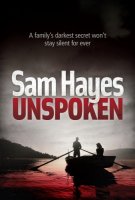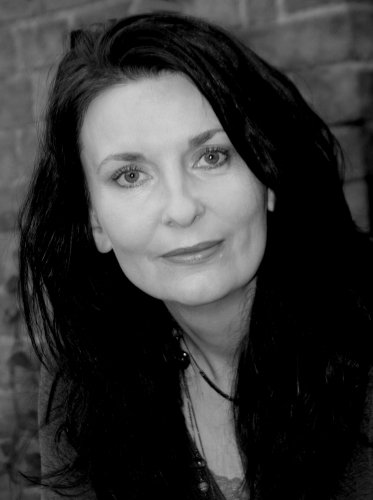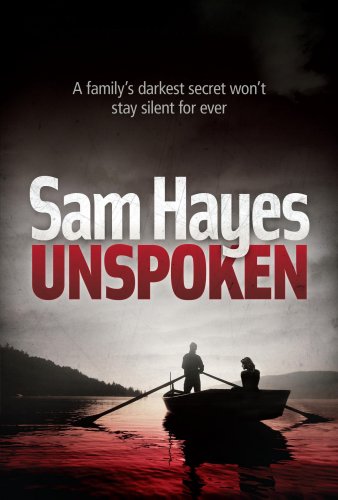|
Sam Hayes grew up in the Midlands, and has lived
in Australia and America. She lives in a three-hundred-year-old farmhouse in a
Leicestershire village with her Australian husband and three children.
If you enjoy books that leave you guessing to
the end, I would thoroughly recommend Sam Hayes. Blood Ties and
Unspoken are real page turners. I was trying to second-guess the plot as I
read them but these novels are written in such a way that just as you think you
have worked things out the twists at the end come as a complete surprise.
Sam Hayes writes about human weakness, the
effects of the past on the present, abduction, prostitution, child abuse, family
secrets and betrayal. Using alternating points of view the author takes the
reader on a complex but rewarding journey with believable and interesting
characters.
Q) You won a short story competition in 2003 and your writing
career began in earnest. Which competition was it? And where did you go from
there?
A small
independent publisher called Bluechrome ran a short story competition when they
were just starting up. I entered and, to my utter surprise, won! My story was
published in an anthology alongside others also picked from the entries.
Following on from this, a few other short stories I'd written were taken by
small magazines and websites. These achievements gave me lots of confidence as a
writer and I also made some useful contacts. I started going to writing
conferences and put work forward at 'Pitch to the Agent' sessions, which are
popular at these type of events. While I didn't secure an agent back then, I did
receive some helpful feedback. My very first novel (out of print now) was
actually published by Bluechrome. Then, as a result of a contact I'd met at a
writers' conference, I went on to write two more novels under a pseudonym for a
mainstream publisher. All this was fantastic experience and taught me so much
about structure, narrative, editing, and the discipline of writing. Finding an
agent isn't easy, but finding one who you get along with and who completely
understands your work seems almost impossible when starting out. I'd approached
agents in the past with my work, but because I hadn't yet written a thriller
clearly my preferred genre! I think this showed in what I was writing. I got
turned down 'nicely' quite a few times, but it wasn't until I'd written Blood
Ties, my first thriller, that things started to really happen. Again,
through a contact, I was introduced to my current literary agency. I feel so
lucky that my agent is really on my wavelength and totally understands where I'm
going with my work; I love brainstorming with her and developing new ideas.
She's very inspirational as well as a good friend. I don't think any two tales
of finding an agent are the same, though. It's certainly a hard task, but
perseverance certainly pays off as I found out!
Q) Why did
you choose to write a thriller?
I'd written
lots of material in several genres before I wrote Blood Ties. While I
always loved what I wrote horror/fantasy and romance I think I instinctively
knew that I hadn't found my niche. So I decided to 'let go' of preconceived
ideas of genre and simply write a book that I would love to read myself. I knew
I wanted to write about an abducted baby and all the emotional trauma that
situation would bring about. I also knew there would be suspense and twists and
obviously a satisfying conclusion to the crime. But I also wanted to write about
real life and real people and make the reader ask the question: What if this
happened to me? With all of these elements, I suddenly realised that I had a
thriller. And it felt totally natural and exciting to be writing in this genre.
Q) What
advice can you give new aspiring writers?
That's easy
write! Lots! Show your work to as many people as you can and listen to what they
say, whether they're in publishing or are simply friends. Don't take criticism
personally, rather use it to your advantage and improve your work. And develop
an incredibly thick skin. There will be rejections from agents and editors. I
have dozens and dozens. But use these only as a way to get better, not as
reasons to give up writing. I also believe that to a certain extent the craft of
writing can be taught, so, for some, enrolling on a course could be useful.
Writing groups (in most main towns/cities) are invaluable and is in fact how I
met a writer who introduced me to my agent. And, of course, read as much as you
can. After all, publishing is a business and has trends just like any other
business. Knowing what's currently popular or what's 'had its day' is important
research. But I guess the most important bit of advice I can offer is write what
you enjoy; write what you would want to read yourself. It will shine through in
your work.
Q) Blood
Ties and Unspoken have themes involving children do you think you
would have written them in the same way if you did not have children of your
own?
No, I very
much doubt it. I have three children and I can honestly say that having been
through motherhood, my take on life has drastically changed since my pre-kid
days. Having a family has naturally heightened my sense of protection and all
the risks children face growing up in the world today. I think this helps make
my work realistic and convincing. Years ago, I was once asked by an agent who
was considering taking me on if I would write a novel about a paedophile. At the
time my children were very young and the thought of writing such a novel was
horrific; and I wasn't sure if I would cope with the research it would involve.
I said I wouldn't do it. Now my novels are steeped in such horrific crimes and,
while it's never an easy subject to write about, I do manage to detach myself
while also staying close enough to the subject matter to make it realistic. But,
none of this is to say that it's impossible to write about emotional family
issues and crimes against children if you don't have children. I just think that
I would have written different books, perhaps with fewer emotional stakes. One
of the main characters, Murray, in Unspoken, sums up how much his family
mean to him towards the end of the book (I won't say more!). I guess I feel the
same.
Q) You learnt to fly a plane before you could drive a car and
worked as a private investigator, bar maid, car cleaner, fruit picker, accounts
clerk, nursery nurse, waitress. Have any of these jobs been of use in your
writing?
There's
nothing like a bit of worldly experience to enrich your writing! It's true I
could fly a light aircraft before I could drive. I was fifteen when I took my
first flying lesson. I may well include a female pilot in a thriller
soon. Working as a private investigator definitely helped shape Louisa in
Blood Ties. She's very glamorous and feisty, and passionate about her
work. Having 'inside' information certainly helped form her character. I left
school at sixteen and so never really trained for a 'proper' job. To be honest,
I didn't really want one. I just wanted to be a writer. I travelled a lot and,
to pay my way, took any work I could get, hence the rather eclectic CV! It was a
great way to meet people, gain experience, and ideas. I was writing all the
while (under my desk in the accounts office!) and building up a bank of
experience. I've lived in the States and Australia, stayed on a kibbutz, lived
in pubs and boats, backpacked through Egypt and Israel, and had a whole host of
jobs here in the UK. I'm able to dip in and out of the things that I've done as
and when I need a certain character. For a writer, it's important to get out
there and live a little. It's really helped enrich my writing.
Q) They say write what you know. Your books are about
people who have lived with lies or the effect of deceit for years, people
experiencing appalling loss, deceit and/or abuse mostly involving children. A
tricky one this, where does it all come from? Imagination every mothers
nightmare? or your own experiences of life? Maybe it should be write what you
know
or fear?
Fortunately,
when it comes to the crimes in my novels and the traumatic situations my
characters find themselves in, I'm not writing from personal experience. I do
huge amounts of research before and during the writing process. Imagination, of
course, is vital when planning and writing, and I think that's something that
evolves as you get older and more experienced. I once told my editor that I
'write my worst nightmares'. She understood this completely. I do write what I
know in that my novels involve the intricacies of family dynamics, emotions, and
real modern-day settings. With good research, tons of imagination really
living and feeling what my characters go through the novels come together. But
it is hard, writing about children in peril. The novel I have recently finished,
Tell-Tale, came about because of the alleged abuse at the Jersey
children's home. Of course, there was plenty of material to research and, as
well as immersing myself in it, I also have to detach somewhat too. But yes,
you're absolutely correct saying 'write what you fear', certainly for thriller
writing anyway.
Q) Where do
you write and how do you organise your writing day?
I have a study
at home, on the top floor of my Edwardian town house, with views over the
rooftops. It's a great place to write. Most of the time, that's where I'll be
working. Occasionally I'll take my laptop to a coffee shop and write. Just being
in a different place can be really inspirational and I don't find the bustle and
conversations around me at all distracting. In fact, I like it. I often bump
into friends, which is nice. It's a lonely business otherwise! Now the children
are older, they're either at school or involved in various activities so I have
lots of time to be creative. I'm quite disciplined and as soon as everyone's
gone out, I'll go to my study. First up is some good coffee and email
checking/answering and I admit to being a bit of a blog-aholic so I'll browse
around some sites usually other authors. I also read the newspapers online and
catch up with any trade news in the Bookseller. Writing-wise, I begin by
reading over what I wrote the day before. I'll give it a mild edit, just so it's
not bugging me too much, but not so I get bogged down with tiny details at the
first draft stage. Then I'll generally write through until lunch, when I'll go
to the gym for an hour or so most days. Again, the afternoon will be writing or
research until about five o'clock. Sometimes though, there are accounts to be
brought up to date, meetings with my agent or publisher, and bursts of editing
back and forth between me and my editor. When a book is at that point, it's
usually when I'm in the early stages of writing the next one. I'm writing my
fourth novel for Headline, so I'm getting used to switching back and forth
between stories now!
Q) Do you
have a plan or outline when you begin a new novel?
Yes, very much
so, although I tend to drift away from my original synopsis. I know lots of
writers say this, but it really is because the characters grow and develop and
start to do things I'd never anticipated. To force them into early ideas isn't
always true to who they are, and so the story will change. But, likewise, if I'm
very set on a certain plot thread and a character has changed to make this
impossible, I'll go back and change them rather than the story. For me, I like
to have a plan, but I can honestly say that I don't always know the ending or
final twist when I begin. It can be a worrying feeling, but when that 'light
bulb' moment comes and I know exactly where I'm going, it's great!
Q) What
books are you reading at the moment?
I'm reading
Wuthering Heights again. I was given an eReader for my birthday and have
the chance to explore lots of classics that perhaps, as a teenager forced to
pull them apart at school, I didn't really appreciate. I'm also reading Harlan
Coben's Tell No One, and I've just bought December by Elizabeth H.
Winthrop. I was intrigued because it's about a young girl who stops speaking. In
my novel Unspoken, a woman also stops speaking for no apparent reason.
Plus there are usually a few gardening and cookery books on the bedside table
that I love dipping in and out of.
Q) Which
books or authors have influenced you?
The very first
writer to really have a powerful influence on me was Richard Bach. I was about
twelve or thirteen and my English teacher presented the class with Jonathan
Livingston Seagull. She told us a little about the book and then got us to
write our own opening paragraph. I don't think she believed me when I said I'd
never read it before, because my opening lines were virtually the same as the
book. She gave me a good mark! When I read the story, I took the similarities as
a good omen and, desperate to be a writer anyway, I applied the metaphors to
myself. It might have taken me the next twenty-five years or so to achieve what
I wanted, but Richard Bach along with his other works showed me the way.
There are lots of modern thriller and fiction writers who I admire. I know some
writers say they don't like to read in their own genre when they're writing for
fear of influencing their own work too much. Thankfully, I don't feel like this
and love reading Sophie Hannah, Val McDermid, Harlan Coben, Nicci French, Jodi
Picoult, Anita Shreve
Q) What
next for Sam Hayes?
Well, I'm
currently writing my fourth novel for Headline, but the next novel to hit the
bookshops after Unspoken (which is out now) is the one I mentioned
before, called Tell-Tale. It's a thriller about Nina, a mother and
wife, who commits suicide. Her body is never found. Part of the novel is set in
a boarding school where troubled Frankie is working and hiding from something in
her past. But the school was a children's home in the eighties and the third
character, Ava, tells her tale of the ghastly abuse that went on there. Chilling
links between the three characters are gradually revealed, bringing the past
very much into the present. The novel I'm working on now is about a stabbing a
tragic story of a fifteen year old boy who is yet another victim of knife crime
in London.
 Thanks very much for your time, Sam.
Thanks very much for your time, Sam.
Novels published by Headline
Blood Ties (2007)
Unspoken (2008)
Tell-Tale (2009)

|








